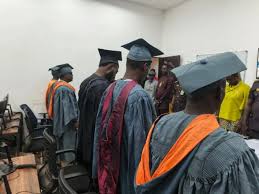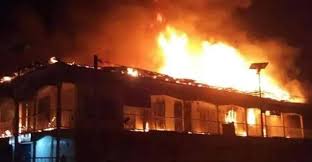
This present hunger should not be politicised
The idea that the impoverished will eventually turn to eating the wealthy is one of the most persistent misconceptions in this nation. But when one looks at the situation in Nigeria, one wonders how much longer people have to go without food until they explode. People who were unable to control their hunger pangs caused several revolutions throughout human history. Famine has been the catalyst for mass demonstrations that have altered the course of history, from Russia in the sixteenth century to South Africa in 2020. It remains to be seen if the hunger experience itself would motivate political action in Nigeria.
"Ebi τ pa wá o!" has become the unifying song of the Bola Tinubu period, thanks to the current economic circumstances. The hunger for food has surpassed the gustatory politics of jęun sókè, which once made our guy popular. It is stated that seven people were killed last Friday in a stampede that broke out after the sale of rice that the Nigeria Customs Service Yaba office "seized." There is so much to say about the organisers' inadequate consideration of crowd control. What level of technological and organisational proficiency did they possess that they relied upon to effectively manage the famished masses that would swarm their offices in search of somewhat more reasonably priced food?
Perhaps all that can be heard in the cries of ebi ń pa wá o is a taming mechanism used to quell agitation, given the speed at which politics of religion and ethnicity are being weaponized! For example, the Yoruba elders in the sociocultural group Afenifere pleaded with their fellow Yorubas not to participate in the public demonstrations that are underway in response to the current economic crisis. Although individuals experience adversity, they also need to be understanding, according to Reuben Fasoranti, chairman of Afenifere's elders caucus. He began by repeating the tired line that previous administrations' mistakes are to blame for our dire circumstances, and then he said, "The government's commitment to adopting these measures is a tribute to its resolve to addressing the core causes of our economic issues, inherited from the ills of the previous years.”
Baba Fasoranti may not be an economic analyst, but I can bet that he has seen enough of Nigerian history to know that important figures in this current administration are included in what he refers to as "the ills of the previous years." I'm not sure if Baba Fasoranti is capable of believing that the ongoing reforms are as restorative as government officials insist. Nigeria did not turn into what it is now because some aliens descended from Mars to torture humanity. Because the same old executioners in statesmen's clothes are serving us again and time again, we feel as though we are trapped in history.
The so-called revolutionary Sunday Igboho, who supported the "Yoruba nation" under Maj. Gen. Muhammadu Buhari (retd.)'s leadership, has also joined the group of Yoruba attenuators. Additionally, he places the blame on Buhari and absolves Tinubu of the present difficulties. I believe he overlooks the fact that the pre-Buhari insecurity scenario that led him to turn into a "freedom fighter" existed before the Buhari administration. I don't remember him giving Buhari the same excuse that he is currently making for his relative. We shouldn't just keep quiet and suffer because every issue in Nigeria is a holdover from a bygone age. When a president can only serve to contextualise, what good is it to elect one?
If there is one constant about our people that people have come to assume by now, it is that the politics of identity will always take precedence over class affinities. Despite the starvation that claimed seven lives as they battled to purchase inexpensive rice, our people are able to keep some sense of the ethnic significance of their response to the famine. After other unions withdrew, it was nearly impossible to hold the NLC protests that were scheduled for Tuesday and Wednesday.
Provocative public commentator Prof. Usman Yusuf, a former executive secretary of the National Health Insurance Scheme, has questioned "why the South-East is uncharacteristically quiet" in reference to the deteriorating status of the economy. He received some self-justifying responses from a number of self-appointed South-East delegates, but given all the hardships they endured under the Buhari regime, who can really blame a South-Easterner for not participating in or organising protests? The South-East did not seem well due to the man's politics, particularly his rash reaction to IPOB's ascent. Why experience turmoil once more, and thus quickly?
Then there was the 2023 election, of course, in which a prominent presidential candidate was an Igbo man. Even though he succeeded in upending Nigeria's political calculations, the results of the election were quite different. The results included numerous examples of electoral trickery, and the winners' triumphalism added to the toxicity. Hence, the quiet in the Southeast may be the result of well-earned schadenfreude. Since "èmilókàn" has evolved into "ebi ń pa wá o," really, why shouldn't they be gloating? Let those who, after eight years of suffering under Buhari, opened their eyes to keep the APC rise up and mend what they damaged.
Yusuf made a valid point regarding how public protests operate in Nigeria, regardless of one's opinion of his choice to single out a particular location in his predictions of political agitations. It is not because they have a better understanding of their past if Nigerians who have been repeatedly harmed by Tinubu's unforgiving policies are suddenly solaced with tales of how everything was ruined by earlier administrations. What other explanation is there for the South-West's complacency if they haven't already used their well-known fury machine to confront the current government about the terrible economic conditions their people are facing, leading them to cry out in the streets, "àwalókàn"?
A different set of circumstances would have led to certain characters—you know who they are—hopping from media outlet to media outlet to air their grievances on the tragic fatalities at the Customs Office. They would have been threatening violence and making accusations of a planned conspiracy to denigrate the "Yoruba race." It's as though they're asking us to wait. Our people have organised tribal troops, and not even famine can stop them.
Would Fasoranti have warned the Yoruba people against holding public protests if Peter Obi or Atiku Abubakar had won the 2023 presidential election? Although I am aware that this is a hypothetical topic, precedents can help us find a solution. Did Buhari and Dr. Goodluck Jonathan also advise Yorubas not to protest because the suffering was ultimately for their benefit?
If our people are to progress, we must get to a point when the area (and the faith) that was successful in electing a leader ought to spearhead the movement in the event that the leader begins to waver. If you cast your vote because you believe the candidate can move mountains, then you have a responsibility to the rest of us to ensure that the better future you imagined at the time of casting your ballot is indeed realised. Those who devote their entire support to a candidate ought to make the effort to hold them responsible as well. Ensuring that the administration of your tribe (or religion) reflects your ideals should be your top priority in addition to wanting to see your tribe (or religion) in power.
Seriously, Tinubu’s supporters owe us public protests and accountability for opening the door to an affliction everyone knew would happen.





